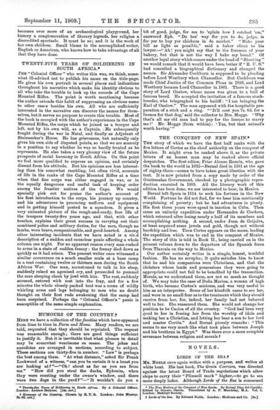TWENTY-FIVE YEARS OF SOLDIERING IN SOUTH AFRICA.*
"Colonial Officer" who writes this was, we think, some- what ill-advised not to publish his name on the title-page. He gives his own portrait in several places and indications throughout his narrative which make his identity obvious to all who take the trouble to look up the records of the Cape Mounted Rifles. The point is worth mentioning because the author extends this habit of suppressing an obvious name to other cases besides his own. All who are sufficiently interested in the narrative can discover the names for them- selves, but it serves no purpose to create this trouble. Most of the book is occupied with the author's experiences in the Cape Mounted Rifles, the corps which he joined as a trooper and left, not by his own will, as a Captain. He subsequently fought during the war in Natal, and finally as Adjutant of Steinaecker's Horse. He has grievances, but naturally only gives his own side of disputed points, so that we are scarcely in a position to say whether he was so hardly treated as he represents. He also takes a very gloomy view of the future prospects of racial harmony in South Africa. On this point we feel more qualified to express an opinion, and certainly dissent from his attitude. But his opinions are less interest- ing than his somewhat rambling, but often vivid, accounts of life in the ranks of the Cape Mounted Rifles at a time when that fine corps was either engaged in war, or in the equally dangerous and useful task of keeping order among the frontier natives of the Cape. We would specially pick out for praise the author's account of his first introduction to the corps, his journey up country, and his adventures in procuring uniform and equipment and in getting himself posted to a squadron. It gives a very animated picture of the rough-and-ready, free life of the troopers twenty-five years ago, and that, with other touches, explains their great success in carrying out their combined police and military duties, for the men, though no lambs, were brave, companionable, and good-hearted. Among other interesting incidents that we have noted is a vivid description of a sudden and causeless panic affecting a whole column one night. For no apparent reason every man rushed to arms in a state of sudden frenzy : the frenzy died down as quickly as it had arisen. The present writer once witnessed a similar occurrence on a much smaller scale at a base camp in a tent containing twelve or thirteen men during the South African War. One man, accustomed to talk in his sleep, suddenly raised an agonised cry, and proceeded to pummel the man sleeping cheek by jowl with him. The rest, suddenly aroused, entered with zest into the fray, and for a few minutes the whole closely packed tent was a scene of wildly whirling arms and legs belonging to men who no doubt thought on their first rude awakening that the camp had been surprised. Perhaps the " Colonial Officer's " panic is susceptible of the same simple explanation.






































 Previous page
Previous page